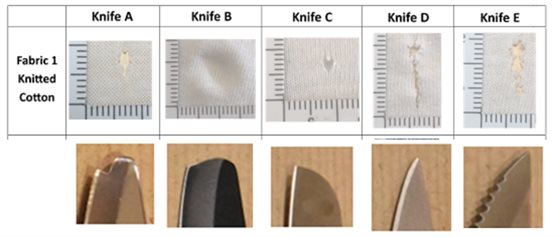The East Midlands Forensics Network is leading the way in bringing together academics and practitioners to jointly advance applied scientific knowledge to improve policing performance.
At the most recent meeting, hosted at the University of Leicester, on 8th September 2022, the participants celebrated recent successes and explored the potential of further accelerating collaborative forensic research.
As well as hearing from the Forensic Innovation Centre (Hampshire Police and the University of Portsmouth), Leisa Nichols-Drew, a Chartered Forensic Practitioner and PhD Researcher at De Montfort University, discussed findings from key research on how to reduce knife crime instances and severity.
In collaboration with DMU’s Dr Rachel Armitage and Dr Kevin Farrugia, University of Leicester’s Professor Robert Hillman and Northumbria University’s Dr Kelly Sheridan, Leisa conducted 300 ‘tests’ using a single downward stabbing motion on four garments, including a t-shirt, a pair of denim jeans, a long-sleeved jumper and a faux leather skirt – all made from different materials.
The five knives used for the experiment included: a blade with an ‘r-shaped’ tip; a blade with a rounded tip; a blade with an asymmetric tapered tip known as a ‘sheepsfoot’; a traditional pointed-tip blade; and a serrated-edged blade with pointed tip.
The results revealed significant differences between the stab hole size and shape, depending on the design of the knife, with all but the rounded tip causing some form of damage.
In fact, the rounded blade did not pierce any of the four fabrics whatsoever, leading researchers to call for conventional pointed-tip knives to be replaced with rounded-tips to minimise the risk of kitchen knives resulting in injuries.

The rounded-tip knife (see Knife B above) did not penetrate the fabric
“Our research suggests that there is an opportunity for crime reduction by swapping pointed-tip knives for rounded blades in the kitchen,” explained Leisa. “A knife that can be used safely and effectively at home without the possibility of accidental injury minimises the risk of it being used as a potential weapon.”
More than 5,000 people were treated by the NHS in 2018/19 due to assault by a sharp object – a 2% increase on the previous year and 41% higher than 2014/15.
“Bladed weapons are frequently encountered in violent crime offences but it’s important to remember that knife crime doesn’t just happen on the street – it can happen anywhere and it often happens in the home, within domestic altercations,” said Leisa.
“With the rounded knife causing no severance damage at all, it should be considered as a clear alternative to pointed-tip knife blades.”
Leisa hopes the findings will be of interest to investigators of knife crime offences, crime-reduction units, knife manufacturers and retailers, who all share the goal of identifying a safer alternative to conventional knife blade design.
To co-produce more world-leading forensic research the East Midlands Network is keen to encourage and support more collaboration to drive research and innovation to support policing. The region is fortunate in having DCC Paul Gibson as the strategic lead for EMPAC, who is also the NPCC lead for digital forensics. Dr Gibson holds a doctorate in molecular medicine and is responsible for leading policing’s transformation of digital forensics by coordinating activity nationally, helping forces realise benefits and standardise practices, and directing the development of digital forensic services by Transforming Forensics and the Forensic Capability Network
Network research priority themes include Forensic Genetics and DNA; Jury Decision Making; Fingerprints and Marks; Crime Scene Examination; Fire and Explosion Investigation; Questioned Documents; Biological Fluids and BPA; Drugs and Toxicology; Fibres, Glass and other traces; Footwear Marks; and Firearms and Ballistics. If you want to get involved with the Network contact Dr Jo Dawkins at:- jo.dawkins@leicester.ac.uk.


Comments